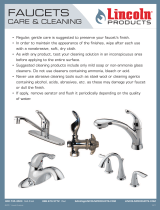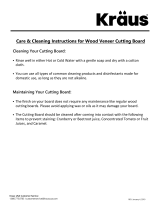
Elkay Sinks, Faucets and Accessories Care and Cleaning
Sinks
Stainless Steel
• General cleaning: use an ordinary mild detergent and soft cloth, rinse and towel dry.
• Steel soap pads should never be used; particles can adhere to a stainless steel sink surface and will eventually rust.
• Light scratches are normal for stainless steel sinks; over time they will blend into the uniform finish pattern.
• Do not use dish mats as these can trap soap and dirt making sink maintenance more time-consuming.
• We recommend the use of an Elkay bottom grid or rinsing basket to protect your sink.
• Avoid storing open containers of household cleaners and chemicals containing chloride such as bleach, acid, and drain
cleaners or toilet bowl cleaner beneath the sink. Vapor emission from the chlorides can cause corrosion and pitting to the
exposed stainless steel and other metals including faucet water supply lines.
Stainless Steel Mirror or Hammered Mirror
• General cleaning: use an ordinary mild detergent and soft cloth, rinse and towel dry.
• Never use abrasive cleaners, including steel soap pads.
Antique Copper Hammered
• General cleaning: use non-abrasive, non-detergent soap and a soft cloth, rinse and towel dry.
• Never use abrasives, metal (copper) cleaners, scouring pads, lime or rust removal, alkaline-based, ammonia-based
or acidic-based chemicals or cleaning products.
• Acidic foods such as juices and ketchup can remove the patina if left on the sink.
• Hard water spots and mineral deposits can be difficult to remove and may result in damage to the patina.
• Light scratches are normal for copper sinks; over time they will blend into the uniform finish pattern.
• Copper has a living finish and its surface tarnishes naturally. You can expect tarnish, scratches, and dents
to appear in your sink over time.
CuVerro® Anti-microbial Copper
• Clean the surface to regular hospital protocols (i.e. appropriate disinfectants, frequency, etc.); be sure to rub
in the direction of the satin finish grain lines; rinse and towel dry.
• Use a cleaner that will not leave a wax film or coating on the surface, so that cleaning will not interfere with the
antimicrobial action of the surface.
• Never use abrasives, metal (copper) cleaners, scouring pads, lime or rust removal, alkaline-based, ammonia-based
or acidic-based chemicals or cleaning products.
• Light scratches are normal for copper sinks; over time they will blend into the uniform finish pattern.
Cast Brass
• General cleaning: use a non-abrasive, non-detergent soap with a soft cloth, rinse and towel dry.
• Never use abrasives, metal cleaners, scouring pads, lime or rust removal, alkaline-based, ammonia-based or
acidic-based chemicals or cleaning products.
• Brass has a living finish and its surface tarnishes naturally. You can expect tarnish, scratches, and dents to appear
in your sink over time.
• Surface waxing is recommended. Each sink provides a factory applied layer of wax. However, after time and use,
this wax layer will need to be rejuvenated. Johnson’s or Trewax Sealer Finish for floors is recommended. Do not use
any waxes that contain polishing agents.
e-granite™ or Quartz
• Most dirt and stains: Wipe with a damp cotton cloth/sponge and soapy water. Towel dry with a cotton cloth.
It is recommended that you clean your sink prior to first use.
• Stubborn stains and water marks: Wipe with a Mr. Clean® Magic Eraser® and either
water or a 50/50 white vinegar and water solution. Towel dry with a cotton cloth.
• Difficult stains: Use a 3M Scotch-Brite™ Heavy Duty Scour Pad with either water, 50/50 white vinegar/water solution
or non-abrasive cleaner. Start cleaning in a a circular motion with constant pressure over the area of the stain, rinse
thoroughly with water and dry with a cotton cloth. Let dry 5-10 minutes. If stain persists, repeat.

.
.
Sinks (cont.)
Fine Fireclay
• General cleaning: use soapy water or vinegar-based cleaner and a sponge and towel dry.
• Water marks: wipe with damp cloth and towel dry.
• Difficult stains: use a 50/50 water/bleach solution or non-abrasive cleaners (follow cleaner manufacturer’s instructions),
rinse and towel dry.
• Do not use strong chemicals such as paint removers or oven cleaners, straight or undiluted bleach solution, abrasive cleaning
products, scouring pads, steel wool or caustic solutions containing ammonia or alkalis.
• Do not set hot pans directly into sink.
• Run cold water when pouring boiling water into sink.
Faucets
• Simply wipe gently with a damp cloth and blot dry with a soft towel.
• Avoid build-up of soap or mineral deposits, as these tend to have an adverse effect on the appearance of the product.
• NEVER use cleaning products of any kind on this product—especially those containing ammonia, bleach or alcohol—or
those with any form of abrasive.
Accessories
• Elkay colanders, cutting boards, rinsing baskets and bottom grids are not designed as “Dishwasher Safe” or “Microwave Safe”.
These products should be hand washed in a mild detergent, rinsed thoroughly and hand dried.
• For wood cutting boards – apply a coat of mineral oil to all wood surfaces on a monthly basis or
more frequently if needed.
• The following are recommendations from the USDA regarding cutting boards:
- Always use a clean cutting board.
- If possible, use one cutting board for fresh produce and a separate one for raw meat, poultry,
and seafood.
- Once cutting boards become excessively worn or develop hard-to-clean grooves, you should replace them.
Elkay Sinks, Faucets and Accessories Care and Cleaning
Elkay • 2222 Camden Court • Oak Brook, Illinois 60523 • elkay.com 9/16
-
 1
1
-
 2
2
Ask a question and I''ll find the answer in the document
Finding information in a document is now easier with AI
Related papers
-
Elkay DRKAD2517554 Owner's manual
-
Elkay ELUH1716DBG User manual
-
Kingsford SS Sink ELGRU13322BS0 Owner's manual
-
Elkay LKPDQSMA User manual
-
Elkay SCUH1416CH User guide
-
Elkay ECU1714ACH Installation guide
-
Elkay ECU1714ACH Installation guide
-
Elkay CR25223 User manual
-
Glacier Bay ELUH3120LPD Owner's manual
-
Elkay HDDB332284QI User manual
Other documents
-
 Lincoln Products 063305 User guide
Lincoln Products 063305 User guide
-
CMI 482-6937 User manual
-
 KRAUS KCB-WS301SA Care & Cleaning Guide
KRAUS KCB-WS301SA Care & Cleaning Guide
-
Northern Oaki Care And Use Instructions
-
Polaris Sinks P519 User manual
-
Y Decor HABR2116 User guide
-
Polaris Sinks P209 User manual
-
Polaris Sinks P909 User manual
-
BLANCO 524260 User manual
-
The Better Bevel 17111 User manual



